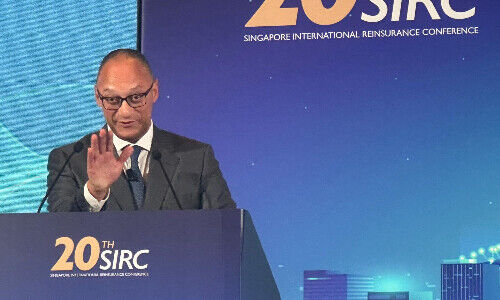How Switzerland is Missing the Fintech Train in Asia
There’s an increasing concern that Switzerland is missing the chance to shape the future of finance. In his commentary, finews.asia founder Claude Baumann clarifies that tomorrow's financial industry is not about capitalist deal-making or profit-driven motives.
From humble beginnings with just a few thousand participants, the Singapore Fintech Festival (SFF) has, within only a few years, become the largest and most important event for financial technology in Asia, a booming market. By the end of this week, more than 70'000 people will have attended this year’s edition.
Today, the event is so significant that it attracts not only a multitude of startups and fintechs showcasing innovations in areas such as generative AI, tokenization, and digital assets, but also financial giants like J.P. Morgan, HSBC, and Tencent, which are investing vast resources in this future world.
Rapid Development
In essence, the SFF, held in Singapore’s expansive expo halls, is shaping the next chapter of the global financial industry. Since its launch in 2016, Switzerland has been a close partner, given the strong ties between the two countries. Singapore’s fast-growing financial hub has frequently drawn inspiration from developments in Switzerland, a global banking powerhouse. Today, however, Switzerland could learn a lot from Singapore’s remarkable progress in the financial sector.
Switzerland’s presence at the SFF is indeed a positive step, highlighted by a prominently placed pavilion. But that’s where the good news ends. Amid a landscape of ambitious startups and forward-thinking nations, Switzerland’s hesitant presence feels inconsequential. Several points underscore this criticism.
Like a «Reduit»
The Swiss presence at the SFF feels convoluted and uninviting, evoking the image of a «Reduit» – a defensive fortress – which carries a certain irony. Credit is due to the Swiss fintech companies that have invested considerable time and resources to make the journey to Singapore. However, what’s notably missing in representing Switzerland’s financial sector are globally recognized ambassadors from its financial industry – of which there is no shortage.
Despite their frequently stated emphasis on Asia, the major Swiss banks seem to have shifted their focus elsewhere. Alternatively, Switzerland Global Enterprise (S-GE) – the official organization for export promotion and location marketing – may have fallen short in drawing these key players to such an important event.
«Point Zero» in Zurich
This is all the more puzzling given that Switzerland is one of the SFF’s closest partners and even hosts a reciprocal event in Zurich every summer called «Point Zero,» which features a high-profile delegation from Singapore, including government officials and ministers.
In previous years, then-Finance Minister Ueli Maurer attended the SFF alongside a delegation of Swiss bankers, while former State Secretary Jörg Gasser appeared on several panels. Today, however, little of this presence remains. The highest-ranking representative is Deputy State Secretary Christoph König, a knowledgeable and eloquent speaker.
Over 400 Sessions Featuring 900 Speakers
Yet, among the 400 sessions featuring 900 speakers, König participates in only one small discussion on «Innovation and Consumer Protection.» Swiss experts are nearly absent from the main stage for major topics; the only exception is Ticino-native Marco Bizzozero, who skillfully represents the US fintech company iCapital.
Representatives from the Swiss National Bank (SNB) and the Swiss Financial Market Supervisory Authority (Finma) attended closed-door round tables, a spokesperson from the State Secretariat for International Financial Matters (SIF) confirmed to finews.ch.
Exemplary Italians
Unlike Italy, for instance, the Swiss stand rarely features presentations or official announcements. In contrast, our southern neighbors actively promote their initiatives with press releases. Switzerland’s passive approach is surprising, especially given that the country hosts three key hubs of financial technology –Zurich, Zug, and, more recently, Lugano – which ideally position it to engage with and influence the latest industry trends.
This reinforces the impression that Switzerland is missing out on shaping tomorrow's financial industry. By «financial industry,» we are not referring to capitalist profiteering but rather to critical issues such as financial inclusion in developing countries, measures against climate change, cybersecurity, sustainable investments (ESG), and global standards to combat financial crime and cybercrime. In this context, fintech provides the infrastructure and fuel for all these innovations.
Report in January
Speaking of innovations: Switzerland has recently launched the Swiss Financial Innovation Desk (FIND) to promote financial innovations domestically and aims, according to its own statements, to strengthen Switzerland as one of the world’s leading financial hubs. This was also highlighted at an event held at the Swiss Embassy in Singapore this week.
To this end, FIND has been working for some time on a report titled «Pathway 2035 for Financial Innovation: Your Navigator,» but it will only be published sometime in January. That is too late. And at the event in Singapore, there was no mention of where this journey might be headed by 2035.
Best Advertisement for Switzerland

Andreas Berger, CEO Swiss Re (Image: finews.asia)
On the other hand, a different, multi-day event in the tropical city-state this week showed how things could be done better: At the 20th Singapore International Reinsurance Conference (SIRC), the entire reinsurance industry gathered under the theme «Revolutionize (Re)Insurance!» At the forefront was Swiss Re, whose CEO Andreas Berger, in office since last July, delivered the keynote speech.
Although he is German rather than Swiss, he represents a company that «still» has «Swiss» in its name – and he did so with great impact, convincingly and globally, in Singapore.




























